The research initiative was inspired by a suggestion from Lee Rainie, director of the Pew Research Center’s Internet & American Life Project, during a visit to Elon University in 2000. He spoke then with faculty members Janna Quitney Anderson and Constance Ledoux Book about gathering a collection of early Internet predictions – this idea was inspired by Ithiel de Sola Pool’s “Forecasting the Telephone.” Thanks to administrative and monetary support primarily provided by Elon University, Imagining the Internet has grown annually to include much more, including: the world’s foremost series of reports on the likely future of digital life – thousands of experts’ opinions in documented in thousands of pages of content over a 20-year span; journalistic print and video documentation of many major technology innovation and policy events between 2005 and 2020; and the foremost collection of video documenting people’s hopes and fears for the impact of the digital communications revolution on future of humanity at the turn of the millennium. Following is a calendar breakdown of Imagining the Internet’s development.
2000-2001
 Survey planning and recruiting was undertaken in November 2000 for the Pew- and Elon-funded project “One Neighborhood, One Week on the Internet.” The daily Internet use of 24 families in a small-town neighborhood in Elon, NC, was documented by a team of 25 undergraduate student researchers led by Janna Anderson over the span of one week in January 2001. Key undergraduate student research assistants were Erica Stanley, Betsy Snavely and Crystal Allen. The work was also documented in a full page of news stories in July 2001 in USA Today: “24,000 Minutes on the Internet.”
Survey planning and recruiting was undertaken in November 2000 for the Pew- and Elon-funded project “One Neighborhood, One Week on the Internet.” The daily Internet use of 24 families in a small-town neighborhood in Elon, NC, was documented by a team of 25 undergraduate student researchers led by Janna Anderson over the span of one week in January 2001. Key undergraduate student research assistants were Erica Stanley, Betsy Snavely and Crystal Allen. The work was also documented in a full page of news stories in July 2001 in USA Today: “24,000 Minutes on the Internet.”
2001-2002
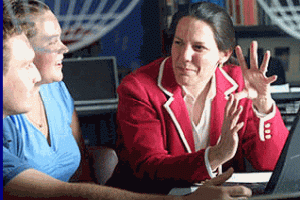 Elon faculty member Connie Book, who later went on to be named Elon University president, undertook a preliminary research report, “Forecasting the Internet: A Retrospective Technology Assessment,” based on the work of Ithiel de Sola Pool and funded by the Pew Internet Project, seeking “future of the Internet” predictions made between 1993 and 1995 in the Lexis-Nexis database, assisted by Elon undergraduates Tiffany Avery, Shannon Bonnezi, Allison Dieboldt, Eric Kastendike, Kristen Kerr, Jessica Rivelli, Brian Sentman, Betsy Snavely, Erica Stanley, Elizabeth Sudduth, Maggie Sullivan and Kate Wodyka. The ensuing 2002 research paper was an analysis of several hundred predictive statements that established the following prediction themes: The Internet will transform society; it will transform economies; content will drive the Internet’s success; the Internet presents security and privacy concerns; the Internet’s growth is dependent on an efficient and reliable infrastructure; the Internet will spawn a new generation of hardware and software; it will create a smaller world; it will transform America’s schools; it will impact professions.The interesting results found in this work made it evident that the predictions research should be expanded upon.
Elon faculty member Connie Book, who later went on to be named Elon University president, undertook a preliminary research report, “Forecasting the Internet: A Retrospective Technology Assessment,” based on the work of Ithiel de Sola Pool and funded by the Pew Internet Project, seeking “future of the Internet” predictions made between 1993 and 1995 in the Lexis-Nexis database, assisted by Elon undergraduates Tiffany Avery, Shannon Bonnezi, Allison Dieboldt, Eric Kastendike, Kristen Kerr, Jessica Rivelli, Brian Sentman, Betsy Snavely, Erica Stanley, Elizabeth Sudduth, Maggie Sullivan and Kate Wodyka. The ensuing 2002 research paper was an analysis of several hundred predictive statements that established the following prediction themes: The Internet will transform society; it will transform economies; content will drive the Internet’s success; the Internet presents security and privacy concerns; the Internet’s growth is dependent on an efficient and reliable infrastructure; the Internet will spawn a new generation of hardware and software; it will create a smaller world; it will transform America’s schools; it will impact professions.The interesting results found in this work made it evident that the predictions research should be expanded upon.
2003
 In 2003, Imagining the Internet got its formal start when Pew Research provided more than $30,000 to fund Anderson’s deeper investigation into early 1990s predictions about the likely future of the internet. Elon Media History professor Harlan Makemson assigned 65 students to each spend several hours assisting Anderson in unearthing and logging predictions as a class assignment. Later, Anderson worked six months to check and clean the data. The research resulted in the Early 1990s Predictions Database: more than 4,200 predictions about the future of the internet made in public media between 1990 and 1995 by 1,000 different voices of the time, from well-connected stakeholders to common netizens. (None of the predictions logged in Book’s initial study were slotted into this online database; the newer study was modeled to implement a more detailed method of searching, identifying, mining and sorting the data.) To see a list of undergraduate researchers who participated go to the end of this page.
In 2003, Imagining the Internet got its formal start when Pew Research provided more than $30,000 to fund Anderson’s deeper investigation into early 1990s predictions about the likely future of the internet. Elon Media History professor Harlan Makemson assigned 65 students to each spend several hours assisting Anderson in unearthing and logging predictions as a class assignment. Later, Anderson worked six months to check and clean the data. The research resulted in the Early 1990s Predictions Database: more than 4,200 predictions about the future of the internet made in public media between 1990 and 1995 by 1,000 different voices of the time, from well-connected stakeholders to common netizens. (None of the predictions logged in Book’s initial study were slotted into this online database; the newer study was modeled to implement a more detailed method of searching, identifying, mining and sorting the data.) To see a list of undergraduate researchers who participated go to the end of this page.
2004
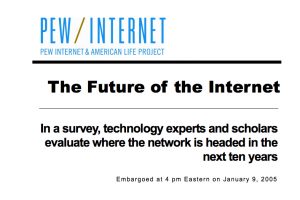 Upon the completion of the Early 1990s Predictions Database, further development of the Imagining the Internet site continued under Janna Anderson’s direction. Lee Rainie of Pew Research was inspired by a suggestion from futurist Bruce Sterling to fund the first of what became a series of Web-based “Future of the Internet” surveys in which experts shared their views on the potential future of the Internet. In 2004 and biennially, annually or biannually over the 20 years to follow, experts quoted in the early 1990s database and thousands of additional technology stakeholders and skeptics have been sent an email invitation to participate in Imagining the Internet’s surveys. The results are published in the Surveys section on this site and those published the first 20 years are also available on the Pew Internet site. See the first “Future of the Internet” survey here. In addition, Anderson added a Voices of the People section of the site that invited the public to share their predictions any time. It was posted online in the fall of 2004. It caught the public’s attention after it was publicized by blogger Christine Boese on CNN’s website. It was left open the next few years, amassing a small but unique set of predictions from around the globe at the dawn of the Internet’s broader global adoption and first major growth spurt.
Upon the completion of the Early 1990s Predictions Database, further development of the Imagining the Internet site continued under Janna Anderson’s direction. Lee Rainie of Pew Research was inspired by a suggestion from futurist Bruce Sterling to fund the first of what became a series of Web-based “Future of the Internet” surveys in which experts shared their views on the potential future of the Internet. In 2004 and biennially, annually or biannually over the 20 years to follow, experts quoted in the early 1990s database and thousands of additional technology stakeholders and skeptics have been sent an email invitation to participate in Imagining the Internet’s surveys. The results are published in the Surveys section on this site and those published the first 20 years are also available on the Pew Internet site. See the first “Future of the Internet” survey here. In addition, Anderson added a Voices of the People section of the site that invited the public to share their predictions any time. It was posted online in the fall of 2004. It caught the public’s attention after it was publicized by blogger Christine Boese on CNN’s website. It was left open the next few years, amassing a small but unique set of predictions from around the globe at the dawn of the Internet’s broader global adoption and first major growth spurt.
2005-2006
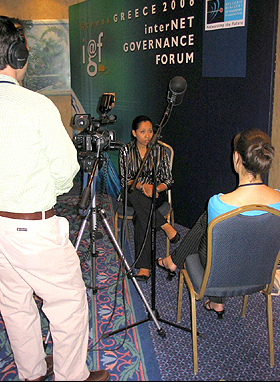 Janna Anderson’s history book based on the initial collection of “Early ’90s” predictions, “Imagining the Internet: Personalities, Predictions, Perspectives,” was published by Rowman & Littlefield and named a top title for academic libraries. The Imagining the Internet site was redesigned to add extra layers of information, expanding beyond the initial projects. In 2005-06, Elon University began funding Elon student-faculty teams’ attendance at global Internet events to capture video interviews and documentary multimedia journalism for the Imagining the Internet Center. Anderson, student Scott Myrick and Elon staff member Bryan Baker recorded interviews with participants at the Accelerating Change conference in Palo Alto, CA, in 2005. Anderson also led interview expeditions to the Metaverse Roadmap Summit (at SRI in Menlo Park, CA, joined by Dan Anderson) and to the first-ever UN-facilitated Global Internet Governance Forum in Athens in 2006 (with student Erin Barnett and Baker). At the suggestion of Elon communications students, additional sections were added to the website in 2006 to: educate children under age 12 – KidZone; help teachers of elementary, middle and high school students use the site – Teachers’ Tips; and provide perspective in narrative form about predictions past and future – Forward 150/Back 150. Those sections of the site remain frozen in time; they reflect the culture and hopeful predictions of the people of 2006.
Janna Anderson’s history book based on the initial collection of “Early ’90s” predictions, “Imagining the Internet: Personalities, Predictions, Perspectives,” was published by Rowman & Littlefield and named a top title for academic libraries. The Imagining the Internet site was redesigned to add extra layers of information, expanding beyond the initial projects. In 2005-06, Elon University began funding Elon student-faculty teams’ attendance at global Internet events to capture video interviews and documentary multimedia journalism for the Imagining the Internet Center. Anderson, student Scott Myrick and Elon staff member Bryan Baker recorded interviews with participants at the Accelerating Change conference in Palo Alto, CA, in 2005. Anderson also led interview expeditions to the Metaverse Roadmap Summit (at SRI in Menlo Park, CA, joined by Dan Anderson) and to the first-ever UN-facilitated Global Internet Governance Forum in Athens in 2006 (with student Erin Barnett and Baker). At the suggestion of Elon communications students, additional sections were added to the website in 2006 to: educate children under age 12 – KidZone; help teachers of elementary, middle and high school students use the site – Teachers’ Tips; and provide perspective in narrative form about predictions past and future – Forward 150/Back 150. Those sections of the site remain frozen in time; they reflect the culture and hopeful predictions of the people of 2006.
2006-2007
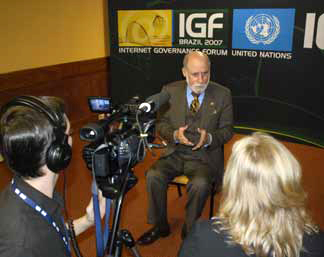 Janna Anderson and Lee Rainie published the results of their second “Future of the Internet” survey. Daily video and written coverage of the second UN Global Internet Governance Forum-2007 in Rio de Janeiro, was captured by an Anderson-led documentary team of Elon faculty, staff and students that included Connie Book, Dan Anderson, J McMerty, Eryn Gradwell, Dannika Lewis, Michele Hammerbacher and Anne Nicholson. Book and Anderson conducted an onsite survey of delegates to IGF 2007, “Realizing the Global Promise of the Internet: The Future of Internet Governance,” the first research to tap into contemporary sentiments in regard to Internet issues live and on the scene of a governance event. Elon undergraduate student Erin Barnett edited together a compilation of interviews from IGF-Athens to complete the documentary film “Bridging the Digital Divide.” The film was selected for presentation at events at IGF-Rio, the Broadcast Education Association and the National Conferences on Undergraduate Research (NCUR). From 2007 through 2020, Elon undergrads presented Imagining the Internet’s Elon University-funded research at NCUR annually.
Janna Anderson and Lee Rainie published the results of their second “Future of the Internet” survey. Daily video and written coverage of the second UN Global Internet Governance Forum-2007 in Rio de Janeiro, was captured by an Anderson-led documentary team of Elon faculty, staff and students that included Connie Book, Dan Anderson, J McMerty, Eryn Gradwell, Dannika Lewis, Michele Hammerbacher and Anne Nicholson. Book and Anderson conducted an onsite survey of delegates to IGF 2007, “Realizing the Global Promise of the Internet: The Future of Internet Governance,” the first research to tap into contemporary sentiments in regard to Internet issues live and on the scene of a governance event. Elon undergraduate student Erin Barnett edited together a compilation of interviews from IGF-Athens to complete the documentary film “Bridging the Digital Divide.” The film was selected for presentation at events at IGF-Rio, the Broadcast Education Association and the National Conferences on Undergraduate Research (NCUR). From 2007 through 2020, Elon undergrads presented Imagining the Internet’s Elon University-funded research at NCUR annually.
2007-2008
 In 2007, Elon University formally established the nonprofit Imagining the Internet Center, based in its School of Communications, with Janna Anderson as director. An Imagining the Internet team including Glenn Scott and undergraduate students Ashley Barnas and Craig Campbell edited and posted four hours of video interviews with 31 global leaders recorded at the OECD’s Future of the Internet Economy conference in Seoul, Korea in 2008. A book-length version of Anderson and Rainies’ first predictions survey was published by Cambria Press, “Up for Grabs: The Future of the Internet I.” In addition, the results of the Elon-Pew 2007 IGF-Rio Internet Policy survey “Realizing the Global Promise of the Internet: The Future of Internet Governance,” were published in a report by Book and Anderson. The results of the third “Future of the Internet” survey conducted by Anderson and Rainie were published in December 2008. More than 100 video clips featuring the Web coverage of the third UN-facilitated Global Internet Governance Forum-2008 in Hyderabad, India, were posted by Anderson, along with PDFs of the IGF 2008 transcripts.
In 2007, Elon University formally established the nonprofit Imagining the Internet Center, based in its School of Communications, with Janna Anderson as director. An Imagining the Internet team including Glenn Scott and undergraduate students Ashley Barnas and Craig Campbell edited and posted four hours of video interviews with 31 global leaders recorded at the OECD’s Future of the Internet Economy conference in Seoul, Korea in 2008. A book-length version of Anderson and Rainies’ first predictions survey was published by Cambria Press, “Up for Grabs: The Future of the Internet I.” In addition, the results of the Elon-Pew 2007 IGF-Rio Internet Policy survey “Realizing the Global Promise of the Internet: The Future of Internet Governance,” were published in a report by Book and Anderson. The results of the third “Future of the Internet” survey conducted by Anderson and Rainie were published in December 2008. More than 100 video clips featuring the Web coverage of the third UN-facilitated Global Internet Governance Forum-2008 in Hyderabad, India, were posted by Anderson, along with PDFs of the IGF 2008 transcripts.
2009-2010
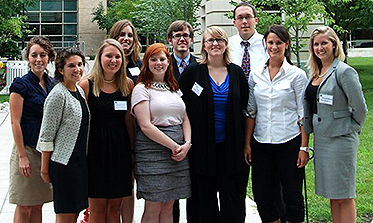 Cambria’s book-length version of Anderson and Rainies’ second expert-predictions survey, “Hopes and Fears: The Future of the Internet II,” was released in January 2009, and the book version of their third survey, “Ubiquity, Mobility, Security: The Future of the Internet III,” was published by Cambria in July. Janna Anderson joined the steering committee of IGF-USA and began sending teams to document its annual gatherings in Washington, D.C. Colin Donohue and Anderson lead a group of students and faculty participating in the planning of the 2009 and 2010 Internet Governance Forum-USA conferences and carrying out full documentary coverage, with written and video accounts added to this site. Elon students Randy Gyllenhaal, Alex Trice, Kirsten Bennett and Morgan Little participated in panels at the events. A second Elon University documentary team collected hundreds of video clips while completing a
Cambria’s book-length version of Anderson and Rainies’ second expert-predictions survey, “Hopes and Fears: The Future of the Internet II,” was released in January 2009, and the book version of their third survey, “Ubiquity, Mobility, Security: The Future of the Internet III,” was published by Cambria in July. Janna Anderson joined the steering committee of IGF-USA and began sending teams to document its annual gatherings in Washington, D.C. Colin Donohue and Anderson lead a group of students and faculty participating in the planning of the 2009 and 2010 Internet Governance Forum-USA conferences and carrying out full documentary coverage, with written and video accounts added to this site. Elon students Randy Gyllenhaal, Alex Trice, Kirsten Bennett and Morgan Little participated in panels at the events. A second Elon University documentary team collected hundreds of video clips while completing a 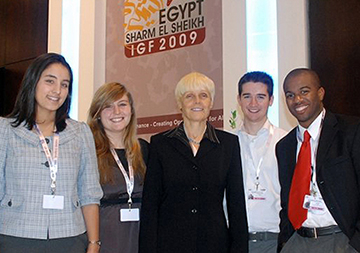 survey and providing written journalistic coverage of the fourth Global Internet Governance Forum-2009 in Sharm El Sheikh, Egypt, in November of 2009; Anderson participated in the panel on “Transnationalization of the Internet,” student Eugene Daniel participated in the “Youth Panel” and the documentary team also included Dan Anderson and Elon students Drew Smith, Andy Diemer and Shelley Russell. In a massive student-faculty project in April 2010, Imagining the Internet planned and carried out FutureWeb, a multi-day, multi-event conference held in conjunction with the Global WWW2010 conference in Raleigh, NC, USA, April 28-30; that team added documentation of FutureWeb events to this site; among the speakers were Vint Cerf, Tim Berners-Lee, danah boyd, Danny Weitzner, Carl Malamud and Doc Searls.
survey and providing written journalistic coverage of the fourth Global Internet Governance Forum-2009 in Sharm El Sheikh, Egypt, in November of 2009; Anderson participated in the panel on “Transnationalization of the Internet,” student Eugene Daniel participated in the “Youth Panel” and the documentary team also included Dan Anderson and Elon students Drew Smith, Andy Diemer and Shelley Russell. In a massive student-faculty project in April 2010, Imagining the Internet planned and carried out FutureWeb, a multi-day, multi-event conference held in conjunction with the Global WWW2010 conference in Raleigh, NC, USA, April 28-30; that team added documentation of FutureWeb events to this site; among the speakers were Vint Cerf, Tim Berners-Lee, danah boyd, Danny Weitzner, Carl Malamud and Doc Searls. 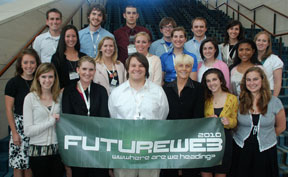 (To see a full list of student participants, click here.) The results of the fourth “Future of the Internet” survey conducted by Anderson and Rainie were revealed in six reports between February and July 2010, including presentations at the annual meeting of the American Association for the Advancement of Science and at the World Futures Conference. A documentary journalism team led by Glenn Scott and including student reporters Bennett, Smith and Samantha Baranowski conducted dozens of interviews and participated in panels at the Global Internet Governance Forum-2010 in Vilnius, Lithuania. Anderson posted roughly 400 video clips and photos from the events of IGF-2010, including a video survey of delegates.
(To see a full list of student participants, click here.) The results of the fourth “Future of the Internet” survey conducted by Anderson and Rainie were revealed in six reports between February and July 2010, including presentations at the annual meeting of the American Association for the Advancement of Science and at the World Futures Conference. A documentary journalism team led by Glenn Scott and including student reporters Bennett, Smith and Samantha Baranowski conducted dozens of interviews and participated in panels at the Global Internet Governance Forum-2010 in Vilnius, Lithuania. Anderson posted roughly 400 video clips and photos from the events of IGF-2010, including a video survey of delegates.
2011-2012
 The Imagining the Internet Center was named a Computerworld Honors Program Laureate for its use of information technology to promote positive social, economic and educational change. In 2011 Anderson produced a 10-minute expert talk on the future of the Internet that was viewed at the Danish Top Executives Summit in Copenhagen; co-led a session on the future of the Internet at the South By Southwest Interactive conference in Austin, Texas, with Paul Jones of UNC-Chapel Hill; delivered a keynote at Webcom 10 in Montreal; and was a keynote speaker at MobilityShifts, a conference on the future of learning hosted by The New School in New York City. Cambria’s book-length version of Anderson and Rainies‘ fourth expert-predictions survey, “Challenges and Opportunities: The Future of the Internet IV,” was published in early 2011. A team of 26 people from Imagining the Internet recorded the events of the Internet Governance Forum-USA 2011, and a team of 23 people recorded all of the details of 16 2012 IGF-USA events. Both IGF-USA conferences took place in Washington, D.C. In the fall of 2011, a documentary video team including Baranowski, Nicole Chadwick, Kellye Coleman, Taylor Foshee and Lee Hopcraft, led by Rich Landesberg, conducted a video survey at the Global Internet Governance Forum-2011 in Nairobi, Kenya. More than 400 video clips were assembled from the survey conducted in Kenya by this team. Eight significant Elon University/Pew Internet reports stemming from the fifth “Future of the Internet” survey conducted by Anderson and Rainie were published in 2012 by the Pew Research Center and the Imagining the Internet Center. The Internet Society provided generous funding support for Anderson to train and lead a team of 10 in conducting multimedia documentary coverage of the Global INET 2012 conference in Geneva, Switzerland,
The Imagining the Internet Center was named a Computerworld Honors Program Laureate for its use of information technology to promote positive social, economic and educational change. In 2011 Anderson produced a 10-minute expert talk on the future of the Internet that was viewed at the Danish Top Executives Summit in Copenhagen; co-led a session on the future of the Internet at the South By Southwest Interactive conference in Austin, Texas, with Paul Jones of UNC-Chapel Hill; delivered a keynote at Webcom 10 in Montreal; and was a keynote speaker at MobilityShifts, a conference on the future of learning hosted by The New School in New York City. Cambria’s book-length version of Anderson and Rainies‘ fourth expert-predictions survey, “Challenges and Opportunities: The Future of the Internet IV,” was published in early 2011. A team of 26 people from Imagining the Internet recorded the events of the Internet Governance Forum-USA 2011, and a team of 23 people recorded all of the details of 16 2012 IGF-USA events. Both IGF-USA conferences took place in Washington, D.C. In the fall of 2011, a documentary video team including Baranowski, Nicole Chadwick, Kellye Coleman, Taylor Foshee and Lee Hopcraft, led by Rich Landesberg, conducted a video survey at the Global Internet Governance Forum-2011 in Nairobi, Kenya. More than 400 video clips were assembled from the survey conducted in Kenya by this team. Eight significant Elon University/Pew Internet reports stemming from the fifth “Future of the Internet” survey conducted by Anderson and Rainie were published in 2012 by the Pew Research Center and the Imagining the Internet Center. The Internet Society provided generous funding support for Anderson to train and lead a team of 10 in conducting multimedia documentary coverage of the Global INET 2012 conference in Geneva, Switzerland, 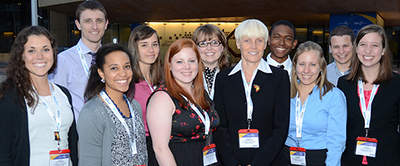 April 22-24, ISOC’s 20th Anniversary Conference, which also featured the inaugural Internet Hall of Fame Ceremony – Rachel Southmayd, Addie Haney, Rebecca Smith, Caitlin O’Donnell, Brandon Marshall, Jacquie Adams, Jeff Flitter, Nicole Chadwick, Brian Meyer and Dan Anderson. Also in 2012: Elon alum Aaron Moger created a video telling the story of Imagining the Internet and its work.
April 22-24, ISOC’s 20th Anniversary Conference, which also featured the inaugural Internet Hall of Fame Ceremony – Rachel Southmayd, Addie Haney, Rebecca Smith, Caitlin O’Donnell, Brandon Marshall, Jacquie Adams, Jeff Flitter, Nicole Chadwick, Brian Meyer and Dan Anderson. Also in 2012: Elon alum Aaron Moger created a video telling the story of Imagining the Internet and its work.
2013-2014
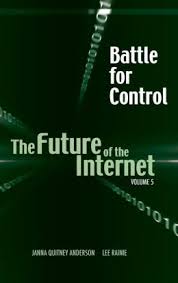 The sixth “Future of the Internet” survey, by Anderson and Rainie was published in eight separate reports in 2014 (one report was not made public). The seven public reports – on the future of the Internet and privacy, the potential for cyberattacks, killer apps, the Internet of Things and wearable and embedded computing, threats to the Net, artificial intelligence and robotics and expectations for digital life in 2025 – generated global discussions and influenced policy concerns. The book version of the fifth “Future of the Internet” survey, “Battle for Control: The Future of the Internet V,” was published by Cambria Press. Since the projects of Imagining the Internet began in 2000, the center has had five website redesigns, the fourth redesign – unveiled in 2013 – was a group effort led by Rebecca Bass, Janna Anderson and Dan Anderson.
The sixth “Future of the Internet” survey, by Anderson and Rainie was published in eight separate reports in 2014 (one report was not made public). The seven public reports – on the future of the Internet and privacy, the potential for cyberattacks, killer apps, the Internet of Things and wearable and embedded computing, threats to the Net, artificial intelligence and robotics and expectations for digital life in 2025 – generated global discussions and influenced policy concerns. The book version of the fifth “Future of the Internet” survey, “Battle for Control: The Future of the Internet V,” was published by Cambria Press. Since the projects of Imagining the Internet began in 2000, the center has had five website redesigns, the fourth redesign – unveiled in 2013 – was a group effort led by Rebecca Bass, Janna Anderson and Dan Anderson.
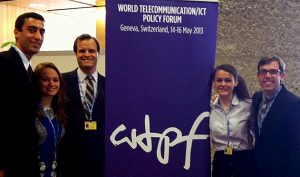 A documentary video team from Imagining the Internet including Julie Morse, Joe Bruno, Brian Mezerski and Ryan Greene, led by Elon faculty Brian Walsh, conducted survey interviews of the delegates to the World Technology Policy Forum and the World Summit on the Information Society. Both events were facilitated by the United Nations in Geneva, Switzerland, in May 2013.
A documentary video team from Imagining the Internet including Julie Morse, Joe Bruno, Brian Mezerski and Ryan Greene, led by Elon faculty Brian Walsh, conducted survey interviews of the delegates to the World Technology Policy Forum and the World Summit on the Information Society. Both events were facilitated by the United Nations in Geneva, Switzerland, in May 2013.
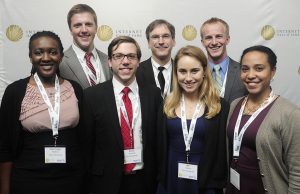 A team including Shakori Fletcher, Katie Blunt, Jeff Ackermann, Alex Rose and Ryan Greene, led by Naeemah Clark and video producer Aaron Moger conducted long-form video interviews with the world’s top Internet leaders at the 87th meeting of the IETF and the 2013 Internet Hall of Fame Induction in Berlin, Germany. Janna Anderson and Lee Rainie spoke in many venues around the world, including presentations at the Internet Privacy Summit in Palo Alto and the American Library Association’s annual conference, to discuss the results of and content included in reports based on thousands of responses to the sixth Future of the Internet Survey. An undergraduate student team including Mia Watkins, Sky Cowans, Brian Mezerski, Addie Haney and Jason Puckett, led by Anthony Hatcher and Moger conducted interviews with Internet leaders at the 2014 Internet Hall of Fame Induction in Hong Kong.
A team including Shakori Fletcher, Katie Blunt, Jeff Ackermann, Alex Rose and Ryan Greene, led by Naeemah Clark and video producer Aaron Moger conducted long-form video interviews with the world’s top Internet leaders at the 87th meeting of the IETF and the 2013 Internet Hall of Fame Induction in Berlin, Germany. Janna Anderson and Lee Rainie spoke in many venues around the world, including presentations at the Internet Privacy Summit in Palo Alto and the American Library Association’s annual conference, to discuss the results of and content included in reports based on thousands of responses to the sixth Future of the Internet Survey. An undergraduate student team including Mia Watkins, Sky Cowans, Brian Mezerski, Addie Haney and Jason Puckett, led by Anthony Hatcher and Moger conducted interviews with Internet leaders at the 2014 Internet Hall of Fame Induction in Hong Kong.
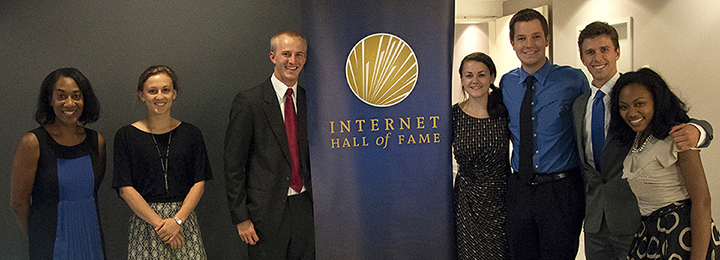
2015-2016
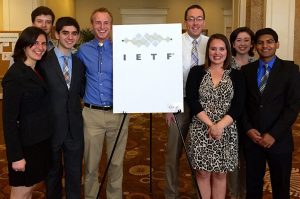 Janna Anderson and Lee Rainie presented research results from the Future of the Internet surveys at major national and international conferences, including RoboUniverse in April 2015 at the Javits Center in New York and the World Future Conference in July 2015 in San Francisco. A documentary video team from Elon University’s Imagining the Internet Center, led by Elon staff members Aaron Moger and Colin Donohue and including student research assistants Rajat Agarwal, Michelle Alfini, Gary Grumbach, Rhett Lawson, Ashley McGetrick and Paige Pauroso recorded and produced hundreds of video answers to a major ethnographic survey of attendees at the 92nd global Internet Engineering Task Force meeting in Dallas, Texas, March 2015. Anderson presented research results in lectures across the country, including a presentation at the US Naval War College on the potential impacts of AI, robotics and the algorithm age on the future of human employment. In November 2015, an eight-member team from Imagining the Internet did ethnographic documentary work at the 10th Global Internet Governance Forum, in João Pessoa, Brazil.
Janna Anderson and Lee Rainie presented research results from the Future of the Internet surveys at major national and international conferences, including RoboUniverse in April 2015 at the Javits Center in New York and the World Future Conference in July 2015 in San Francisco. A documentary video team from Elon University’s Imagining the Internet Center, led by Elon staff members Aaron Moger and Colin Donohue and including student research assistants Rajat Agarwal, Michelle Alfini, Gary Grumbach, Rhett Lawson, Ashley McGetrick and Paige Pauroso recorded and produced hundreds of video answers to a major ethnographic survey of attendees at the 92nd global Internet Engineering Task Force meeting in Dallas, Texas, March 2015. Anderson presented research results in lectures across the country, including a presentation at the US Naval War College on the potential impacts of AI, robotics and the algorithm age on the future of human employment. In November 2015, an eight-member team from Imagining the Internet did ethnographic documentary work at the 10th Global Internet Governance Forum, in João Pessoa, Brazil. 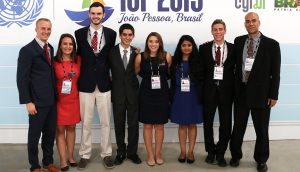 The group interviewed nearly 100 of the 1,200 IGF participants, asking five research questions about the future of the Internet that were collected in five playlists that contain nearly 500 video clips. The Global IGF 2105 research was conducted by Elon University undergraduates Pauroso, Michael Bodley, Grumbach, Jackie Pascale, Leena Dahal and Jacob LaPlante of Elon University’s School of Communications, under the supervision of Elon faculty/staff Moger, Kenn Gaither and Anderson. On July 14, 2016, a 21-person team from Imagining the Internet led by Donohue, Baker and Anderson completed full multimedia documentation of the Internet Governance Forum-USA.
The group interviewed nearly 100 of the 1,200 IGF participants, asking five research questions about the future of the Internet that were collected in five playlists that contain nearly 500 video clips. The Global IGF 2105 research was conducted by Elon University undergraduates Pauroso, Michael Bodley, Grumbach, Jackie Pascale, Leena Dahal and Jacob LaPlante of Elon University’s School of Communications, under the supervision of Elon faculty/staff Moger, Kenn Gaither and Anderson. On July 14, 2016, a 21-person team from Imagining the Internet led by Donohue, Baker and Anderson completed full multimedia documentation of the Internet Governance Forum-USA. 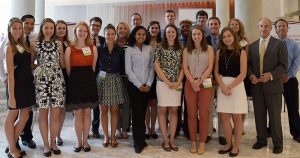 Among the 14 events of IGF-USA 2016 were panel sessions on privacy/security/encryption, the struggle over promoting free speech while trying to find ways to counter violent extremism online, the Global Connect project to provide Internet access to the next 1.5 billion people, and a special event on the efforts to complete the full transition of oversight of IANA to ICANN. On Sept. 30, 2016, Imagining the Internet awarded its inaugural Areté Medallion to Vint Cerf; the medallion honors highly distinguished humanist innovators, change agents and thought leaders who have dedicated their lives to initiating and sustaining significant contributions that have positively impacted the global future. The 2016 Global IGF took place Dec. 5-9 in Guadalajara, Jalisco, Mexico,
Among the 14 events of IGF-USA 2016 were panel sessions on privacy/security/encryption, the struggle over promoting free speech while trying to find ways to counter violent extremism online, the Global Connect project to provide Internet access to the next 1.5 billion people, and a special event on the efforts to complete the full transition of oversight of IANA to ICANN. On Sept. 30, 2016, Imagining the Internet awarded its inaugural Areté Medallion to Vint Cerf; the medallion honors highly distinguished humanist innovators, change agents and thought leaders who have dedicated their lives to initiating and sustaining significant contributions that have positively impacted the global future. The 2016 Global IGF took place Dec. 5-9 in Guadalajara, Jalisco, Mexico,  where undergraduate researchers Elizabeth Bilka, Ashley Bohle, Melissa Douglas, Maya Eaglin, Alex Hager, Caroline Hartshorn, Paul LeBlanc, Kailey Tracyand Anna Zwingelberg worked under the supervision of Elon faculty/staff Moger, Vanessa Bravo and Anderson with some assistance from Diego Pineda Davilla. The team recorded more than 100 interviews with IGF participants from 50 nation-states, asking six questions tied to the future of the Internet and posting nearly 700 video clips.
where undergraduate researchers Elizabeth Bilka, Ashley Bohle, Melissa Douglas, Maya Eaglin, Alex Hager, Caroline Hartshorn, Paul LeBlanc, Kailey Tracyand Anna Zwingelberg worked under the supervision of Elon faculty/staff Moger, Vanessa Bravo and Anderson with some assistance from Diego Pineda Davilla. The team recorded more than 100 interviews with IGF participants from 50 nation-states, asking six questions tied to the future of the Internet and posting nearly 700 video clips.
2017-2018
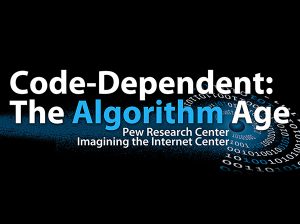 In 2017 Imagining the Internet produced six major reports in the “Future of the Internet” series it sponsors with Pew Research. These reports, co-authored by Janna Anderson and Lee Rainie were based on a set of survey questions answered by more than 1,800 expert respondents in mid-2016: “Code-Dependent: Pros and Cons of the Algorithm Age – Will Impacts of the Networked, Automated World be Mostly Positive?” published Feb. 8, 2017; “The Future of Free Speech, Trolls, Anonymity and Fake News Online: Experts Fear Uncivil and Manipulative Behaviors on the Internet Will Persist – and May Get Worse,” published March 29; “The Future of Jobs and Jobs Training: Will Well-Prepared Workers be Able to Keep Up in the Race With AI and Will Market Capitalism Survive?” published May 3; “The Internet of Things Connectivity Binge: What Are the Implications?” published June 6; and “The Fate of Online Trust in the Next Decade” published August 10, and “The Future of Truth and Misinformation Online,” published Oct. 9.
In 2017 Imagining the Internet produced six major reports in the “Future of the Internet” series it sponsors with Pew Research. These reports, co-authored by Janna Anderson and Lee Rainie were based on a set of survey questions answered by more than 1,800 expert respondents in mid-2016: “Code-Dependent: Pros and Cons of the Algorithm Age – Will Impacts of the Networked, Automated World be Mostly Positive?” published Feb. 8, 2017; “The Future of Free Speech, Trolls, Anonymity and Fake News Online: Experts Fear Uncivil and Manipulative Behaviors on the Internet Will Persist – and May Get Worse,” published March 29; “The Future of Jobs and Jobs Training: Will Well-Prepared Workers be Able to Keep Up in the Race With AI and Will Market Capitalism Survive?” published May 3; “The Internet of Things Connectivity Binge: What Are the Implications?” published June 6; and “The Fate of Online Trust in the Next Decade” published August 10, and “The Future of Truth and Misinformation Online,” published Oct. 9.
In July 2017, a team of 19 students (pictured below) was organized and led by Colin Donohue, Bryan Baker, Janna Anderson and Tommy Kopetskie in multimedia documentary coverage of 13 events at IGF-USA 2017 in Washington DC.
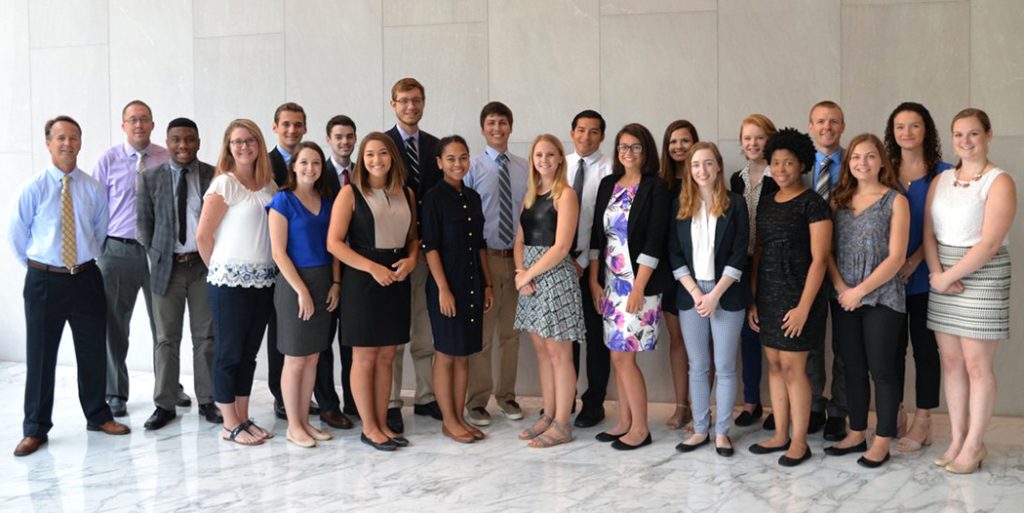
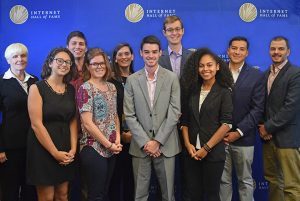 In September, a documentary journalism team that included Diego Pineda Davila, Melissa Douglas, Maya Eaglin, Alex Hager, Meg Malone, Alexandra Roat, Jared Mayerson and Erik Webb conducted interviews with incoming Hall of Fame inductees and young innovators at the 2017 Internet Hall of Fame Induction and Internet Society 25th Anniversary conference at the University of California-Los Angeles under the direction of Elon faculty Janna Anderson and David Bockino.
In September, a documentary journalism team that included Diego Pineda Davila, Melissa Douglas, Maya Eaglin, Alex Hager, Meg Malone, Alexandra Roat, Jared Mayerson and Erik Webb conducted interviews with incoming Hall of Fame inductees and young innovators at the 2017 Internet Hall of Fame Induction and Internet Society 25th Anniversary conference at the University of California-Los Angeles under the direction of Elon faculty Janna Anderson and David Bockino.
In December, undergraduate researchers Cammie Behnke, Melissa Douglas, Maya Eaglin, Meagan Gitleman, Alex Hager, Jared Mayerson, Emmanuel Morgan, Jackie Pascale and Alexandra Roat worked under the supervision Bockino and Anderson to conduct a video survey of participants in the Global Internet Governance Forum 2017 at United Nations headquarters in Geneva, Switzerland, producing nearly 900 responses to five important questions.
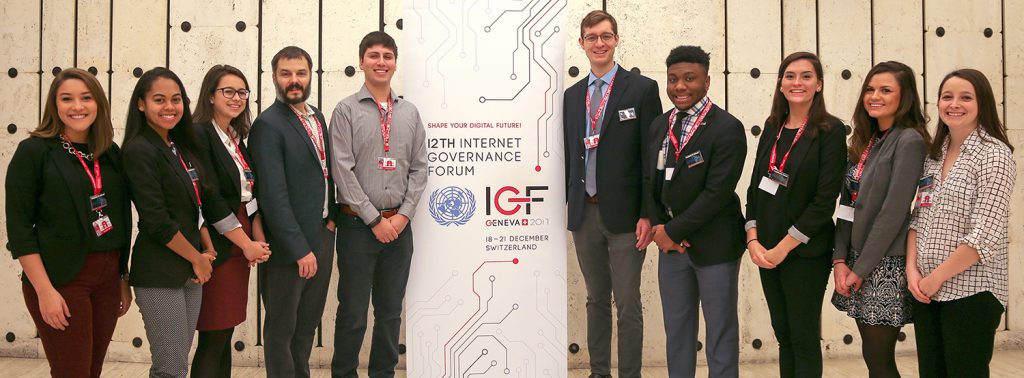
In April and July 2018, Imagining the Internet and Pew’s Internet & Technology project published, in two parts, a massive 272-page report authored by Anderson and Rainie, “The Future of Well-Being in a Tech-Saturated World.” In it, a plurality of experts said digital life will continue to expand people’s boundaries and opportunities, while nearly a third said that although networked humans gain vast advantages there are also downsides, and they expect digital life will be mostly harmful to people’s health, mental fitness and happiness in the next decade. In May 2018, Sir Tim Berners-Lee was honored as the second recipient of the Areté Medallion, awarded to highly distinguished humanist innovators, change agents and thought leaders who have dedicated their lives to initiating and sustaining significant contributions that have positively impacted the global future.
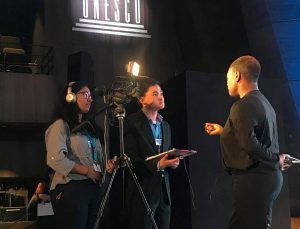 Imagining the Internet sent a 10-person team prepared by Anderson and led by Bockino and Luchsinger to the Global Internet Governance Forum in Paris to record interviews at UNESCO headquarters with more than 150 Internet leaders from 55 nation-states in November 2018. The student-faculty team asked about the best new tech tools likely to emerge in the near future, about how to better inspire global cooperation in the digital age and about how best to tackle the toughest communications challenges of today.
Imagining the Internet sent a 10-person team prepared by Anderson and led by Bockino and Luchsinger to the Global Internet Governance Forum in Paris to record interviews at UNESCO headquarters with more than 150 Internet leaders from 55 nation-states in November 2018. The student-faculty team asked about the best new tech tools likely to emerge in the near future, about how to better inspire global cooperation in the digital age and about how best to tackle the toughest communications challenges of today.
In December, Imagining the Internet and Pew Research released an important report on “AI and the Future of Humans,” asking, “Will AI help most people be better off in 2030 than they are in 2018?” About 63% of the expert respondents to this survey predicted that most people will be better off most of the time in 2030 and 37% said most people will not be better off most of the time, however, 92% of respondents expressed some concerns over the future for humans in one or more of these categories: human agency, jobs, data abuse, surveillance, the erosion of democracy, weaponization of information and the erosion of many highly valued cognitive and social capabilities. The report, by Anderson, Rainie and Luchsinger was released at the People-Centered Internet conference in San Jose, CA, an event also featuring talks by Web innovator Sir Tim Berners-Lee, Google VP and Internet pioneer Vint Cerf and Web pioneer Dame Wendy Hall.
2019-2020
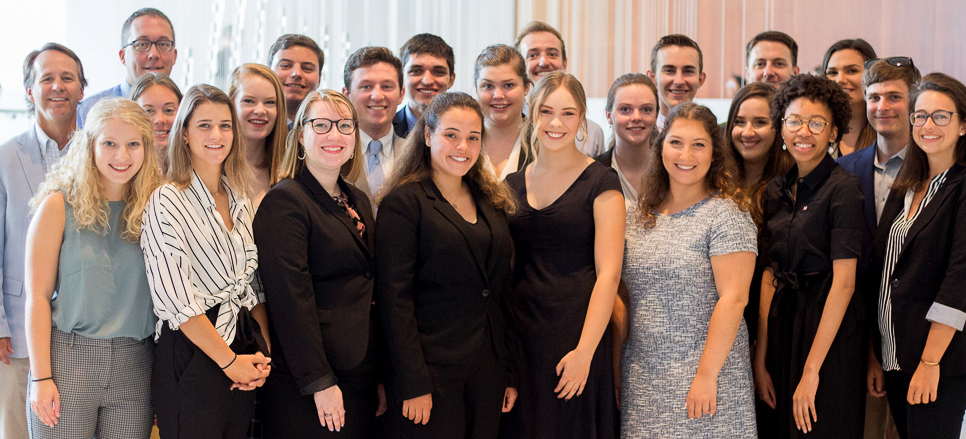 Janna Anderson and Lee Rainie briefed industry, government and research leaders on “The Future of Trust” at the National Academies of Sciences at a February Research Roundtable.
Janna Anderson and Lee Rainie briefed industry, government and research leaders on “The Future of Trust” at the National Academies of Sciences at a February Research Roundtable.
In July 2019, a team of 20 students was led by Colin Donohue and Bryan Baker with assistance from Anderson and Luchsinger in near-real-time multimedia documentary coverage of 10 events at IGF-USA 2019 at the Center for Strategic and International Studies in Washington DC.
A five-person team from Imagining the Internet led by Alex Luchsinger recorded individual interviews and the induction speeches of 2019 inductees into the Internet Hall of Fame Sept. 27, 2019, in San Juan, Costa Rica.
In celebration of the 50th anniversary of the first host-to-host networked computing connection of the early days of ARPANET, Elon University and Pew Research partnered on a 127-page report titled “The Next 50 Years of Digital Life.” The report, written by Kathleen Stansberry, Anderson and Rainie, includes the opinions of internet pioneers and hundreds of experts about the progress of the internet in its first 50 years and where could be headed in the next 50.
Anderson also produced a spinoff report based on a secondary question asked in the study: “What will historians’ verdict be 50 years from now about the internet’s impact today on people’s social, economic and political lives?”
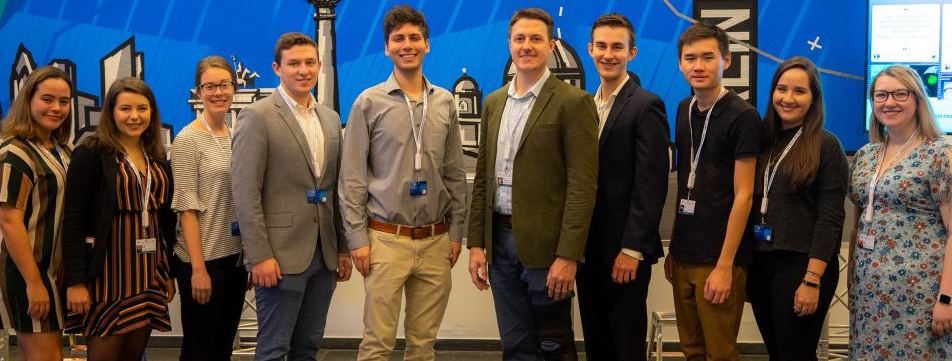
In late November 2019, a 10-person team from Imagining the Internet conducted a documentary-research video survey of more than 100 participants in the Global Internet Governance Forum in Berlin, Germany. The team, led by Luchsinger, interviewed more than 100 Internet leaders from dozens of nation-states about their hopes and fears due to the looming opportunities and challenges of the digital age.
* It should be noted that in 2018-2019, long before the COVID-19 pandemic arrived, the dean of the School of Communications at that time, Rochelle Ford, completely cut all funding and university support for the fielding of traveling undergraduate student documentary video research teams, so the long tradition of Elon students participating in and providing coverage of major global and national Internet policy events came to an end. The Center’s only work from this point on was the continuation of its long-running series of expert surveys on the potential future of digital life.
In February 2020 Anderson and Rainie published a research report on the future of democracy in the digital age: “Experts Say Digital Disruption Will Hurt Democracy.” About half of the experts canvassed said humans’ uses of technology will weaken democracy between 2020 and 2030 due to the speed and scope of reality distortion, the decline of journalism and the impact of surveillance capitalism. Elements of research and editing assistance on this report were provided by Emily Vogels of Pew Research.
In June 2020 Anderson, Rainie and Vogels released a follow-up research report to the “Democracy” report, this one centered on the same group of experts’ views on “The Future of Social and Civic Innovation.” A majority – 84% – predicted there will be significant social and civic innovation between 2020 and 2030 in response to the recent techlash, while 16% said there will not be significant social and civic innovation in the timeframe.
In December 2020, this same trio published “2020 Digital Life: Predictions in Retrospect,” a snapshot analysis that considered all of the predictions for 2020 that were made by respondents to Elon and Pew’s expert canvassings over the entire body of research to this point. Many forecasts were on the mark, while some did not fully anticipate many of the elements influencing the way networked technology might evolve. Experts who offered updated views, including Nicholas Carr and Jamais Cascio said the internet’s overwhelming impact on humans’ intelligence and emotional condition was vastly underappreciated.
2021-2022
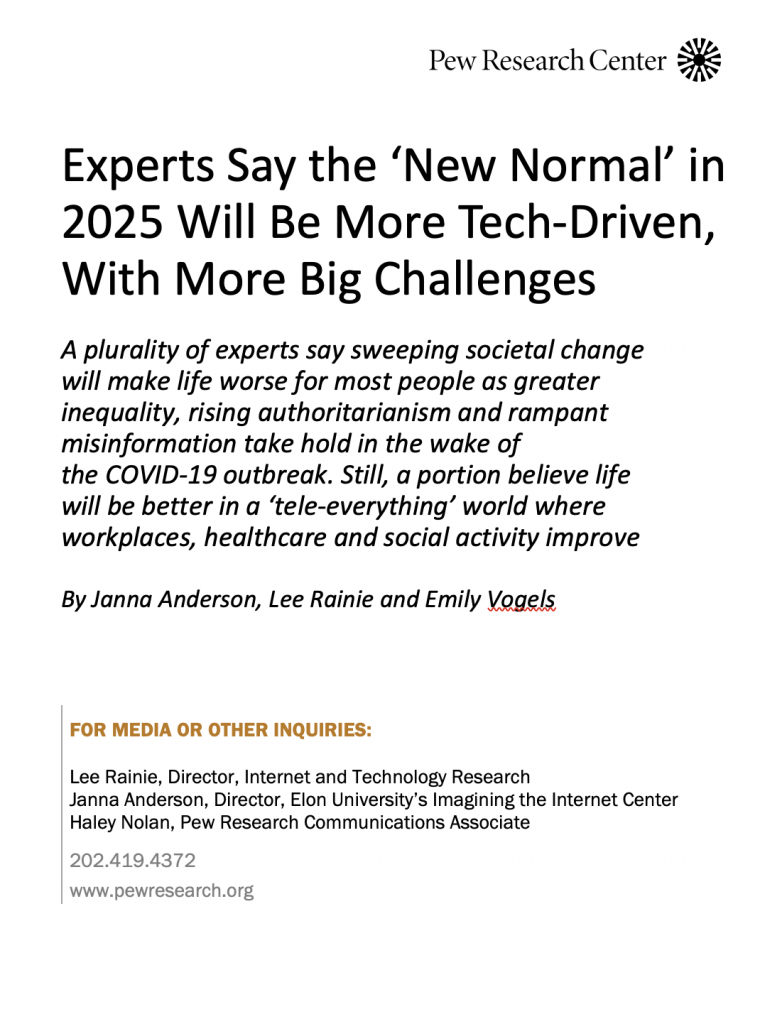 In February 2021, Anderson and Rainie published “The New Normal in 2025,” an analysis of 915 experts’ predictions about what digital life might be like in 2025, in the wake of the arrival of the COVID-19 pandemic. Most respondents said they expect that daily life will be worse for most people over the five-year span due to economic stress, greater inequality, rising authoritarianism and rampant misinformation. They also said that people’s reliance upon digital systems at this time of emergency will lead to advances in such systems that improve healthcare, social interaction and even most workplaces in a “tele-everything” world. The report was released Feb. 18, 2021.
In February 2021, Anderson and Rainie published “The New Normal in 2025,” an analysis of 915 experts’ predictions about what digital life might be like in 2025, in the wake of the arrival of the COVID-19 pandemic. Most respondents said they expect that daily life will be worse for most people over the five-year span due to economic stress, greater inequality, rising authoritarianism and rampant misinformation. They also said that people’s reliance upon digital systems at this time of emergency will lead to advances in such systems that improve healthcare, social interaction and even most workplaces in a “tele-everything” world. The report was released Feb. 18, 2021.
In April 2021 Elon University and the Imagining the Internet Center honored Wikipedia and Wikimedia innovator and leader Jimmy Wales with the center’s Areté Medallion, which honors humanist online innovators for their contributions to society. As Wales was celebrated with this honor also honored were all of the Wikipedia creators, editors and supporters globally whose sustained contributions continually make these public-knowledge resources possible.
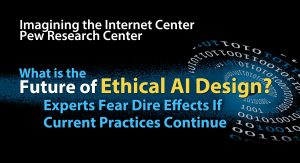 In June 2021 Anderson and Rainies’ report “Experts Doubt Ethical AI Will Be Broadly Adopted As the Norm Within the Next Decade” was released. Of primary concern to these experts was the fact that humanity’s rapidly advancing AI ecosystem is developed and dominated by businesses seeking to compete and maximize profits and by governments seeking to compete, surveil and exert control. A majority said it is quite unlikely that AI design will evolve to be more focused on the common good by 2030. The report briefly touched on the possibilities for an assist from quantum computing; the experts were split on QC’s potential for aiding implementation of ethical AI.
In June 2021 Anderson and Rainies’ report “Experts Doubt Ethical AI Will Be Broadly Adopted As the Norm Within the Next Decade” was released. Of primary concern to these experts was the fact that humanity’s rapidly advancing AI ecosystem is developed and dominated by businesses seeking to compete and maximize profits and by governments seeking to compete, surveil and exert control. A majority said it is quite unlikely that AI design will evolve to be more focused on the common good by 2030. The report briefly touched on the possibilities for an assist from quantum computing; the experts were split on QC’s potential for aiding implementation of ethical AI.
In 2021 and early 2022 Elon University and Pew Research released two reports by Anderson and Rainie that reveal insights from a summer 2021 canvassing of experts. The first, “The Future of Digital Spaces and Their Role in Democracy,” released November 22, 2021, contains insights as to the forces at play, along with suggested solutions to increasingly worrisome trends. The second report, “Visions of the Internet in 2035,” released Feb. 7, 2022, shares the same experts’ hopes for the “better world online” they’d like to see by 2035.
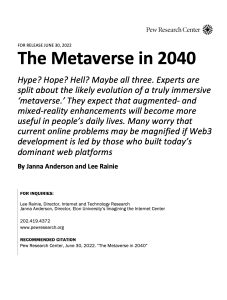 In Elon and Pew’s 15th “future of the Internet” canvassing, conducted by Anderson and Rainie in the winter/early spring of 2022, experts were asked to imagine “The Metaverse in 2040.” The resulting report, released June 30, 2022, illuminates more than 600 experts’ thoughts about how extended-reality (XR) tools – AR, MR and VR – and “the metaverse” might evolve between 2022 and 2040 and what that might mean for society. While most expressed excitement about the potential positives for further XR and metaverse development, many said they expect that current problems due to humans’ design and uses of digital tools will be magnified if the design and operation of much-more-immersive and deeply AI-driven platforms is led by the corporate interests that built the dominant web platforms of the 2020s.
In Elon and Pew’s 15th “future of the Internet” canvassing, conducted by Anderson and Rainie in the winter/early spring of 2022, experts were asked to imagine “The Metaverse in 2040.” The resulting report, released June 30, 2022, illuminates more than 600 experts’ thoughts about how extended-reality (XR) tools – AR, MR and VR – and “the metaverse” might evolve between 2022 and 2040 and what that might mean for society. While most expressed excitement about the potential positives for further XR and metaverse development, many said they expect that current problems due to humans’ design and uses of digital tools will be magnified if the design and operation of much-more-immersive and deeply AI-driven platforms is led by the corporate interests that built the dominant web platforms of the 2020s.
2023-2024
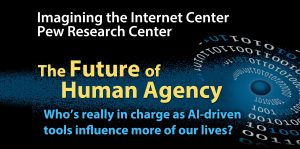 In February 2023, Anderson and Rainie published “The Future of Human Agency,” an analysis of 540 experts’ expectations for the future of human agency and free will as AI-driven applications, systems and bots take over significantly more decisions in all aspects of individuals’ daily lives in the digital age. In a summer 2022 canvassing (many months prior to the breakthroughs of ChatGPT AI later in the year), they were asked: By 2035, will smart machines, bots and systems powered by artificial intelligence be designed to allow people to easily be in control of most tech-aided decision-making that is relevant to their lives? A 56% to 44% majority said they expect the trend toward individuals losing and/or ceding continually more of their agency to tech will continue and people will not gain more influence over tech-driven decision-making.
In February 2023, Anderson and Rainie published “The Future of Human Agency,” an analysis of 540 experts’ expectations for the future of human agency and free will as AI-driven applications, systems and bots take over significantly more decisions in all aspects of individuals’ daily lives in the digital age. In a summer 2022 canvassing (many months prior to the breakthroughs of ChatGPT AI later in the year), they were asked: By 2035, will smart machines, bots and systems powered by artificial intelligence be designed to allow people to easily be in control of most tech-aided decision-making that is relevant to their lives? A 56% to 44% majority said they expect the trend toward individuals losing and/or ceding continually more of their agency to tech will continue and people will not gain more influence over tech-driven decision-making.
In June 2023 in their report “As AI Spreads, Experts Predict the Best and Worst Changes in Digital Life By 2035” Anderson and Rainie published a 232-page analysis of more than 300 experts’ responses – thousands of predictions – in reply to the following question: As you look ahead to 2035, what are the best and most beneficial changes, and what are the most harmful and menacing changes that are likely to occur in digital technology and humans’ use of digital systems? We are particularly interested in your thoughts about how developments in digital technology and humans’ uses of it might improve human-centered development of digital tools and systems; human connections, governance and institutions; human rights; human knowledge; and human health and well-being.” Most of experts expressed worries over how current digital trends might influence daily life in the near future. More than a third, 37%, said they were more concerned than excited about the digital change to come by 2035, and 42% said they were equally concerned and excited about what they expected to see as they imagine the next decade-plus.
In the Fall of 2023 preparations began for the rebranding of Imagining the Internet as Imagining the Digital Future. The original Imagining the Internet site is now the archives location for the first 24 years of Elon University’s research into the future of the human network in the digital age. A new website was constructed to host the research of the Imagining the Digital Future Center. Rainie was hired to direct the new center, with Anderson remaining as director of Imagining the Internet’s 24-year archive and continuing as the co-author of the center’s primary research reports – the regular canvassings of tech experts and stakeholders to capture insights into the potential future. The new center was unveiled Feb. 29, 2024 at an event that also announced the results of a canvassing titled “The Future Impact of AI by 2040.”

